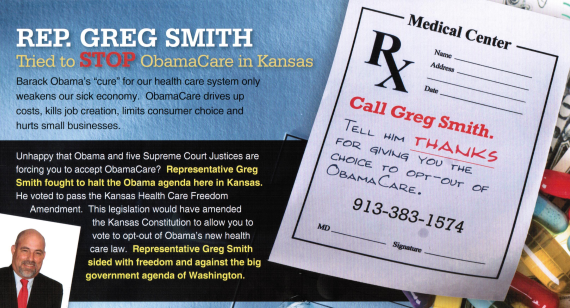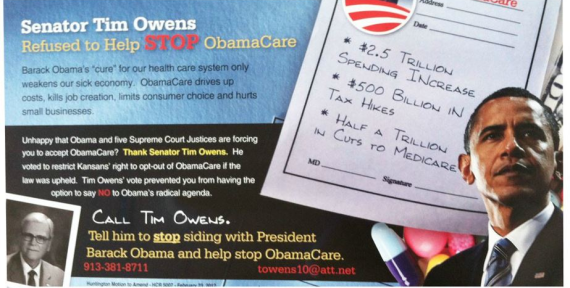A conservative group misleads Kansas voters in campaign mailers that claim a failed proposal to amend the state’s Constitution would have allowed residents to opt-out of “Obamacare.”
No state law can do that. The U.S. Constitution’s Supremacy Clause explicitly states that federal law is the “supreme Law of the Land.”
The proposed Kansas Health Care Freedom Amendment, like several similar state proposals and laws, declared that no law can compel Kansans to buy health insurance or require them to pay a fine for lacking it.
The legislation failed in the Kansas Senate in February by one vote, preventing it from appearing on the November ballot for final voter approval. Law professors and the Congressional Research Service have said such laws would have “no effect” on the federal law.
Some of the mailers attack moderate Republican state senators who voted against the amendment. Other fliers support conservative Republican lawmakers who voted for it. Two of the mailers we received go too far in their description of what the amendment could have done for Kansans.
One mailer makes the slippery statement that the legislation “would have amended the Kansas Constitution to allow you to vote to opt-out of Obama’s new health care law.”
That’s true. Kansans could have voted — but on a purely symbolic level.
Another mailer claims a state senator “voted to restrict Kansans’ right to opt-out of Obamacare if the law was upheld [by the Supreme Court].” That right does not exist.
Our thanks to Chris Masoner of Lenexa, Kan., who uploaded two of the mailers to our Spin Detectors page, through which we ask our readers to help us monitor political claims and campaigns across the country. Masoner, a “lifelong” Republican and law school graduate, said the claim that the amendment would’ve stopped “Obamacare” caught his eye. “I know a little bit about the Supremacy Clause,” he said.
A Hollow Amendment
The Kansas chapter of Americans for Prosperity mailed tens of thousands of these fliers to Republican voters ahead of the state primary, which is Tuesday.
AFP-Kansas supports conservative state Senate candidates who are trying to oust a block of moderate Republican incumbents in the Statehouse.
Americans for Prosperity is a 501(c)(4) nonprofit advocacy group, which means it can raise unlimited amounts of money and does not have to disclose its donors. Derrick Sontag, AFP Kansas state director, told the Lawrence Journal-World that the money raised for the mailers came from Kansas. The Kansas chapter failed to return our phone calls and emails.
David Koch founded AFP. He and his brother, Charles Koch, are co-owners of Koch Industries, which is based in Wichita. The brothers have been major contributors to AFP and to the political action committee of the Kansas Chamber of Commerce, which has spent more than $280,000 on Republican races in the state. Much of that money funded mailers and broadcast advertising for conservatives trying to win political races against moderates.
The proposed Kansas Health Care Freedom Amendment required a two-thirds majority in the state House and Senate before it could be placed on November’s ballot for final approval.
The measure passed the House but failed in the Senate by one vote in February. Six Republican senators voted against it, expressing concerns that the law would be meaningless. Some argued that the U.S. Supreme Court would soon rule on the constitutionality of the health care law, a decision that would overrule any state law if the federal law was upheld.
One of the mailers’ targets, Sen. Pete Brungardt, told the Salina Journal that the amendment “never had any relevance.”
“If the Supreme Court ruled it invalid, then it doesn’t matter. And if the Supreme Court ruled it valid, which it did, then that’s the law, anyway. So I voted not to waste the money or time to clutter up the ballot with something that had no meaning,” he said.
Another target of the mailers, Sen. Tim Owens, told the Associated Press in February that the amendment would mislead voters.
“This is nothing more than it looks good, it feels good and we’re sending some kind of message, but we really don’t know that it’s going to do anything for us at all,” he said.
Sontag, of AFP Kansas, told the Lawrence Journal-World that even with the Supreme Court ruling, Kansans deserved an opportunity to vote on the Affordable Care Act, because there will continue to be efforts to repeal it.
But AFP’s mailers fail to explain that the votes would’ve been symbolic gestures.
The flier targeting Owens claims he “voted to restrict Kansans’ right to opt-out of Obamacare if the law was upheld. Tim Owens’ vote prevented you from having the option to say NO to Obama’s radical agenda.”
Another mailer supports state Senate candidate Greg Smith, who voted to approve the amendment as a state representative. The flier claims the “legislation would have amended the Kansas Constitution to allow you to vote to opt-out of Obama’s new health care law.”
Stephen McAllister, a law professor at the University of Kansas, wrote in the Kansas Law Review in 2011 that the proposed amendment “can have no effect” on the federal law. He cited the U.S. Constitution’s Supremacy Clause, which states that laws of the United States “shall be the supreme Law of the Land.”
McAllister, 2011: Indeed, it is clear that, if adopted, such an amendment can have no effect on the constitutionality or application of the federal health care law to Kansas and to Kansans. If Congress has the power to enact the individual health insurance mandate, then no state constitutional amendment, or state statute, can preclude the operation of such a federal law on a state’s citizens.
Kathleen Swendiman, a legislative attorney for the non-partisan Congressional Research Service, noted in a July 9 report to Congress that several states have enacted statutes and amendments opposing the Affordable Care Act. Citing the Supremacy Clause, she also wrote that the state laws “will have no effect” on the federal law.
For example, Swendiman wrote, the U.S. Supreme Court in the 1950s upheld a federal law mandating desegregation of public schools in the face of Arkansas’ constitutional amendment that prohibited integration.
Our fact-checking colleagues at PolitiFact debunked a similar claim about Florida’s proposed amendment, which will be on the state’s ballot this November.
Florida’s Senate president had tweeted in 2011 that the amendment “will allow Floridians to opt out of Obama’s govt. takeover of healthcare!”
PolitiFact pointed out that many of these state amendments followed an American Legislative Exchange Council blueprint. The proposals were designed to support litigation against the health care law — not as automatic and hollow exemptions.
For example, ALEC’s 2011 “State Legislatures Guide to Repealing Obamacare” stated that litigation could be launched against the law if the original lawsuits failed. Lawmakers in Kansas based the state’s proposed amendment on ALEC’s model.
But in an email to us this week, the University of Kansas’ McAllister, who also serves as the state solicitor general, wrote that the Supreme Court decision affirming the health care law settles the issue of future litigation.
“So the real issue with respect to the healthcare law always was whether the federal law was constitutional, which the Supreme Court held that it is in late June,” he wrote. “Once that determination is made, then the federal law will preempt any contrary or conflicting state law.”
Timothy Jost, a law professor at Washington and Lee University, wrote in the New England Journal of Medicine that state attempts to nullify the health care law are “pure political theater.”
Jost told us in a phone interview this week that “short of secession, there is nothing a state can do to stop the application of federal law.”
— Ben Finley

